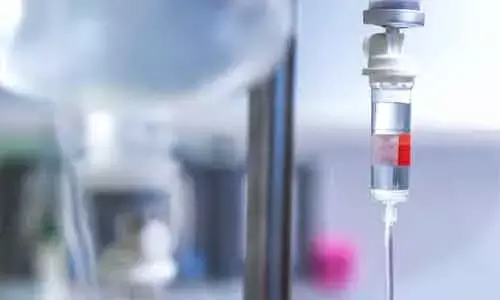- Home
- Medical news & Guidelines
- Anesthesiology
- Cardiology and CTVS
- Critical Care
- Dentistry
- Dermatology
- Diabetes and Endocrinology
- ENT
- Gastroenterology
- Medicine
- Nephrology
- Neurology
- Obstretics-Gynaecology
- Oncology
- Ophthalmology
- Orthopaedics
- Pediatrics-Neonatology
- Psychiatry
- Pulmonology
- Radiology
- Surgery
- Urology
- Laboratory Medicine
- Diet
- Nursing
- Paramedical
- Physiotherapy
- Health news
- Fact Check
- Bone Health Fact Check
- Brain Health Fact Check
- Cancer Related Fact Check
- Child Care Fact Check
- Dental and oral health fact check
- Diabetes and metabolic health fact check
- Diet and Nutrition Fact Check
- Eye and ENT Care Fact Check
- Fitness fact check
- Gut health fact check
- Heart health fact check
- Kidney health fact check
- Medical education fact check
- Men's health fact check
- Respiratory fact check
- Skin and hair care fact check
- Vaccine and Immunization fact check
- Women's health fact check
- AYUSH
- State News
- Andaman and Nicobar Islands
- Andhra Pradesh
- Arunachal Pradesh
- Assam
- Bihar
- Chandigarh
- Chattisgarh
- Dadra and Nagar Haveli
- Daman and Diu
- Delhi
- Goa
- Gujarat
- Haryana
- Himachal Pradesh
- Jammu & Kashmir
- Jharkhand
- Karnataka
- Kerala
- Ladakh
- Lakshadweep
- Madhya Pradesh
- Maharashtra
- Manipur
- Meghalaya
- Mizoram
- Nagaland
- Odisha
- Puducherry
- Punjab
- Rajasthan
- Sikkim
- Tamil Nadu
- Telangana
- Tripura
- Uttar Pradesh
- Uttrakhand
- West Bengal
- Medical Education
- Industry
Hypertonic saline stimulated copeptin reliably Diagnoses AVP deficiency in Polyuria Polydipsia Syndrome patients

A recent trial published in the New England Journal of Medicine shed light on the challenging diagnosis of arginine vasopressin (AVP) deficiency versus primary polydipsia, a puzzle in the field of water balance disorders. The study involved 158 adult patients and compared the diagnostic accuracy of two stimulation methods: hypertonic saline and arginine.
Out of the participants, 44% received a diagnosis of AVP deficiency, while 56% were diagnosed with primary polydipsia. The diagnostic accuracy was notably higher with hypertonic saline–stimulated copeptin (95.6%) compared to arginine-stimulated copeptin (74.4%). The estimated difference of -21.2 percentage points emphasizes the superiority of hypertonic saline in diagnosing AVP deficiency.
Interestingly, 72% of the participants expressed a preference for arginine testing over hypertonic saline, indicating a potential shift in the landscape of diagnostic preferences.
Adverse events associated with both tests were generally mild. Notably, arginine-stimulated copeptin at or below 3.0 pmol per liter demonstrated a specificity of 90.9% for diagnosing AVP deficiency. Conversely, levels exceeding 5.2 pmol per liter led to a diagnosis of primary polydipsia with a specificity of 91.4%.
These findings carry significant clinical implications, suggesting that hypertonic saline–stimulated copeptin is the preferred method for accurately diagnosing AVP deficiency in adult patients with polyuria polydipsia syndrome. The results underscore the need for a nuanced approach to water balance disorders and provide clinicians with valuable insights into optimizing diagnostic protocols.
This trial marks a crucial step forward in refining diagnostic approaches for water balance disorders, potentially revolutionizing the way AVP deficiency is identified and managed. The study calls for a reassessment of current diagnostic paradigms, with hypertonic saline emerging as the frontrunner in accuracy and patient preference.
Source:
Refardt, J., Atila, C., Chifu, I., Ferrante, E., Erlic, Z., Drummond, J. B., Indirli, R., Drexhage, R. C., Sailer, C. O., Widmer, A., Felder, S., Powlson, A. S., Hutter, N., Vogt, D. R., Gurnell, M., Soares, B. S., Hofland, J., Beuschlein, F., Fassnacht, M., … Christ-Crain, M. (2023). Arginine or Hypertonic Saline–Stimulated Copeptin to Diagnose AVP Deficiency. In New England Journal of Medicine (Vol. 389, Issue 20, pp. 1877–1887). Massachusetts Medical Society. https://doi.org/10.1056/nejmoa2306263
Neuroscience Masters graduate
Jacinthlyn Sylvia, a Neuroscience Master's graduate from Chennai has worked extensively in deciphering the neurobiology of cognition and motor control in aging. She also has spread-out exposure to Neurosurgery from her Bachelor’s. She is currently involved in active Neuro-Oncology research. She is an upcoming neuroscientist with a fiery passion for writing. Her news cover at Medical Dialogues feature recent discoveries and updates from the healthcare and biomedical research fields. She can be reached at editorial@medicaldialogues.in
Dr Kamal Kant Kohli-MBBS, DTCD- a chest specialist with more than 30 years of practice and a flair for writing clinical articles, Dr Kamal Kant Kohli joined Medical Dialogues as a Chief Editor of Medical News. Besides writing articles, as an editor, he proofreads and verifies all the medical content published on Medical Dialogues including those coming from journals, studies,medical conferences,guidelines etc. Email: drkohli@medicaldialogues.in. Contact no. 011-43720751


